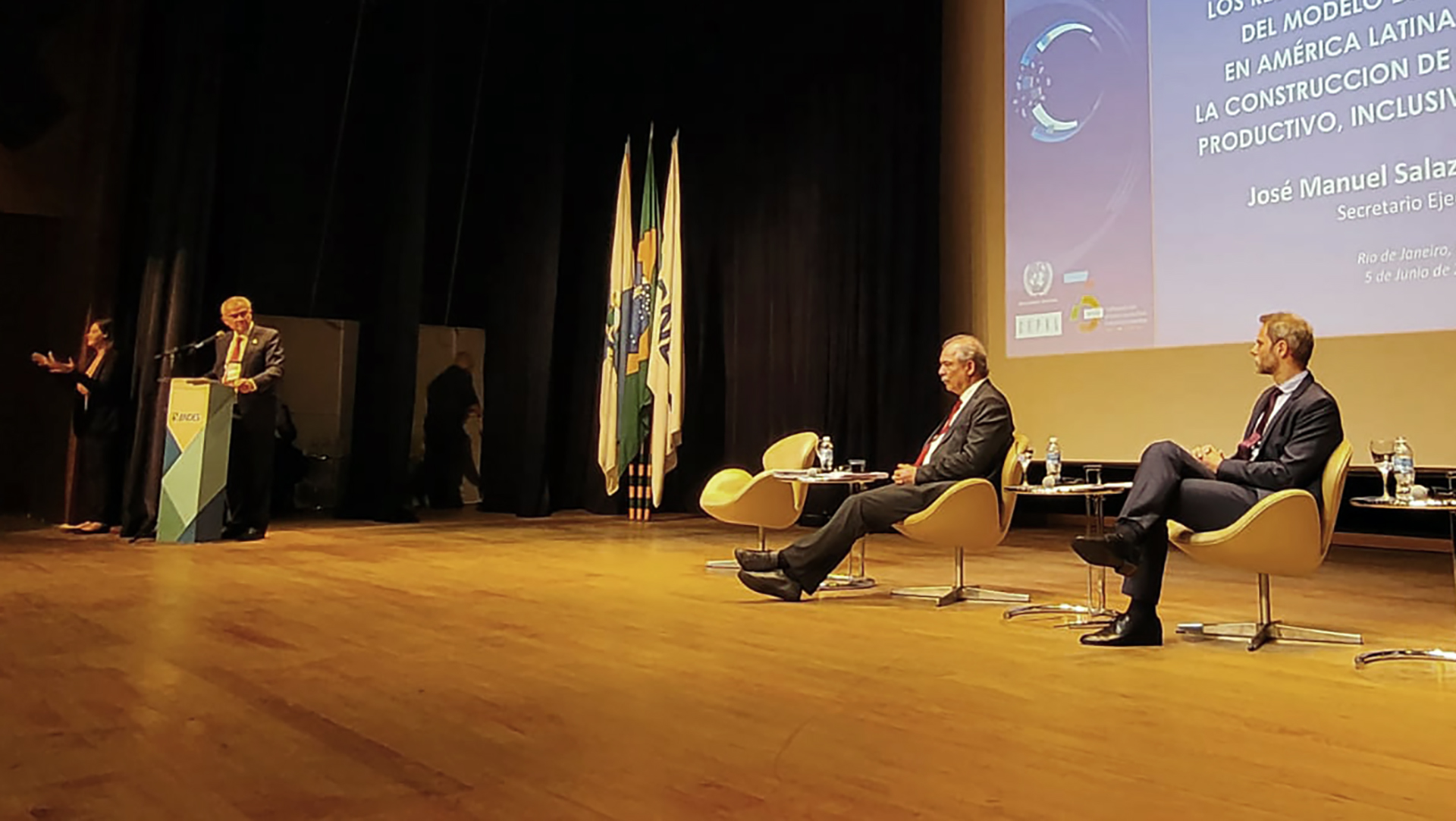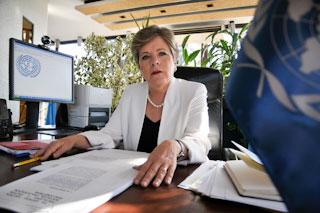Press Release
Latin America and the Caribbean needs to pivot in the transformation of its development model in order to move towards a more productive, inclusive and sustainable future, José Manuel Salazar-Xirinachs, Executive Secretary of the Economic Commission for Latin America and the Caribbean (ECLAC), affirmed today at the inauguration of the seminar Financing for the Big Push for Sustainability, which took place at the headquarters of the Brazilian Development Bank (BNDES) in Rio de Janeiro, Brazil.
“We need a reactivation with transformation,” ECLAC’s highest authority emphasized at the start of an official visit to Brazil, which will extend through Wednesday, June 7 and contemplates activities in Rio de Janeiro and Brasilia.
“It is necessary to act with a sense of urgency and raise the ambition level of policy efforts. This is not a time for gradual and timid changes, but instead for transformative and bold policies that would really make a difference on development,” he said during his presentation at the seminar co-organized by ECLAC, BNDES and the Friedrich Ebert Stiftung foundation (FES).
Joining José Manuel Salazar-Xirinachs in inaugurating the event were Aloizio Mercadante, President of BNDES, and Christoph Heuser, Representative of FES in Brazil.
In his opening remarks, the President of BNDES pointed up the long history of cooperation between Brazil’s development bank and ECLAC along with the challenges for collaboration in the current context of a new transformative, digital and sustainable industrialization.
Christoph Heuser, meanwhile, stressed that the partnership between ECLAC and FES has always been virtuous and incorporates matters of shared interest, such as the progress towards fulfillment of the Sustainable Development Goals (SDGs), employment and gender equality, not just conceptually but in the distinct areas that can include a just transformation.
In his presentation, ECLAC’s Executive Secretary recalled that the region is at a turning point vis-à-vis the cascading crises that are exacerbating historical gaps. He added that globalization is no longer what it was over the last 30 years: it has shifted to a regionalism marked by protectionist tendencies, the reconfiguration of global value chains fueled by geopolitical motives, and a rivalry over technological supremacy.
In the social realm, meanwhile, ECLAC’s highest authority specified that extreme poverty and poverty are still above pre-pandemic levels: in late 2022, poverty affected 201 million people (32.1% of the total population) and the number of people living in extreme poverty was 82 million (13.1%), due to the combined effects of low growth, the labor market and inflation.
He warned that in Latin America and the Caribbean, only 25% of the Sustainable Development Goal targets exhibit behavior that enables forecasting their fulfillment by 2030; 48% shows a correct, but insufficient trend; and the remaining 27% exhibits a backsliding trend. Therefore, “75% of the targets are at risk of not being fulfilled, unless decisive action is taken to resume the correct path,” he warned.
In order to move towards a reactivation with transformation, ECLAC proposes ten priority areas, the senior United Nations official stated. These areas are: promotion of productivity, productive development, employment and inclusive growth; reduction of inequality; strengthening of social policies and social protection; education and vocational training; gender equality and the care economy; sustainability and climate change; digital transformation; proper management of migration flows; regional economic integration; and macroeconomics for development.
Furthermore, he underscored that the policies aimed at strategic sectors matter, which is why ECLAC is proposing 13 areas of opportunity for growth and collaboration, which include the energy transition, electromobility, the care society, the medical devices industry, sustainable water management and e-government, among others.
“We have to place productive bets on these dynamic sectors. If done well and in a sustained way over a couple of decades, this really makes a difference on productivity and growth and is an essential part of development strategies,” he stressed.
Finally, he called for establishing a permanent social dialogue that would connect institutions with citizens and political and social stakeholders, and would create broad consensus on the course of development.
“At ECLAC, we strongly promote forward-looking dialogues because spaces for dialogue have many benefits: collectively we can better visualize scenarios and understand restrictions, and also they serve as ways to broaden consensus,” he concluded.
In the framework of the seminar, ECLAC and FES-Brasil presented the document Financing the Big Push: Paths for Unlocking the Social and Ecological Transition in Brazil (Financiando o Big Push: caminhos para destravar a transição social e ecológica no Brasil).
The visit by ECLAC’s Executive Secretary to Rio de Janeiro included a bilateral meeting with Aloizio Mercadante, in which they agreed to deepen the partnership between ECLAC and BNDES and establish a new phase of strengthened collaboration. More specifically, they agreed on the creation of a BNDES-ECLAC +70 Work Group, in allusion to the work group that both organizations maintained in the past, with the aim of promoting research and training on matters related to sustainable development in Brazil and the region.
Later, ECLAC’s top representative visited the Oswaldo Cruz Foundation – Fiocruz, where he signed an extension on a joint cooperation agreement.
On Tuesday, June 6 and Wednesday, June 7, José Manuel Salazar-Xirinachs will hold a series of bilateral meetings with high-level authorities in Brasilia.

